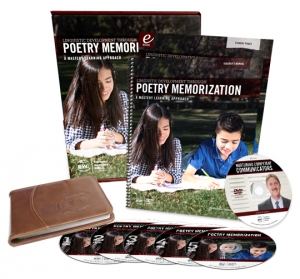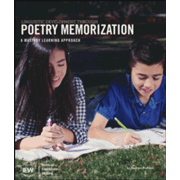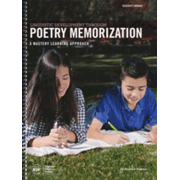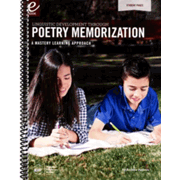The Linguistic Development through Poetry Memorization course comes with one DVD, five audio CDs, a teacher’s manual, and a downloadable student book (also available as a printed book at extra cost). The course has five levels which should be used over a number of years.
The course’s presenter, Andrew Pudewa, lays the groundwork with his video presentation, “Nurturing Competent Communicators.” He explains that to become an effective communicator, a child must have “a large database in his brain of reliably correct and sophisticated language patterns.” Children have to have heard excellent language over and over again to build up these patterns and neural connections. The evidence of this being accomplished is the student's sophisticated speech and writing.
Pudewa says that two very effective ways to accomplish this are by reading great literature and poetry aloud to children (and teens) and by having them memorize poetry and speeches. This course applies both of these strategies.
Methods used in the Suzuki method for teaching music are applied here. Children should start at as young an age as possible to learn by memory—in this case poetry—then practice the memorized material frequently so that it is established in long-term memory. They are supposed to recite every poem they have learned every day, although there will almost certainly be days skipped from time to time. The student book has a record-keeping chart for each level where students can mark off the days on which they recite.
The course is explained in the teacher’s manual. It essentially consists of memorizing 80 poems over a span of four years by listening, reading, practicing, and reciting. The poems are provided for you, and they are divided into four levels, reflecting increasing length and more-challenging vocabulary. The selected poems are drawn primarily from those written in the nineteenth and twentieth centuries and are in the public domain. Each level concludes with an opportunity for a parent or student to choose a poem of their own to memorize, either from the five or six suggestions in the teacher's manual or from elsewhere.
Even as the difficulty increases through the levels, the course intermixes short and long poems to give students a break with some poems that are easier to memorize. The chosen poems vary from silly and witty to serious and inspiring—a selection that exposes children to a wide breadth of styles.
The second poem in the first level is this very short poem, titled “Celery,” written by Ogden Nash.
Celery, raw
Develops the jaw,
But celery stewed,
Is more quietly chewed.
You can see how easy this should be to memorize. The first four poems are all short, but the fifth has four stanzas. Even though it's longer, the fifth poem, “After the Party” by William Wise, has short lines that rhyme and should be easy to remember. It begins:
Jonathan Blake
Ate too much cake,
He isn’t himself today;
He’s tucked up in bed
With a feverish head,
And he doesn’t much care to play.
Other poems, such as those by Robert Louis Stevenson and Christina Rossetti, have a more serious tone. An example of one of the lengthier, serious poems is “Desiderata” by Max Ehrmann in the fourth level. This poem begins:
Go placidly amid the noise and the haste,
and remember what peace there may be in silence.
A few of the poems, such as John Dryden’s “Grand Chorus,” are religiously oriented, but the program is secular enough in its approach that it can be purchased for students enrolled in government-funded programs.
Instead of poetry, the fifth level of this program presents speeches and documents (or excerpts from the originals) for students to memorize. The 20 speeches are presented in the course chronologically, beginning with “Socrates’ Apology” by Plato (translated by Benjamin Jowett) and the “First Oration against Catiline” by Cicero. Among other speeches and documents are Patrick Henry’s “Give Me Liberty,” the “Declaration of Independence,” William Wilberforce’s “1789 Abolition Speech,” Abraham Lincoln’s “The Gettysburg Address,” Winston Churchill’s “We Shall Fight on the Beaches,” and Aung San Suu Kyi’s “Freedom from Fear.” A list of 19 alternate speeches is included in case parents or students want to substitute for or add to the selections.
The poems and speeches are all printed in both teacher and student manuals. Pudewa reads the poems and speeches on the other four audio CDs, making it easy for children to listen over and over again. (Purchasers also get the audio recordings as downloadable MP3 files at no extra cost.)
The appendices in the teacher’s manual provide useful material. The first appendix has brief biographies of the authors whose works are included. The second has a one-page bibliography with sources for additional poems and speeches. The third appendix has “Lesson Enhancements,” extra activities you might use for each of the selected poems through the fourth level. Some activities have to do with language arts, such as one that has students identify rhyming words in a poem and others that have students identify particular literary devices. Other activities might venture into science topics or historical events alluded to in poems. While these activities are supplemental and optional, they are likely to give students a greater understanding and appreciation for the poems, potentially making them easier to memorize.
Linguistic Development through Poetry Memorization might seem daunting at first. I suspect the biggest challenge will actually be developing a habit of daily recital. Nevertheless, Andrew Pudewa makes a compelling case for the value of these learning strategies, and the design of this course makes it easy to implement.













